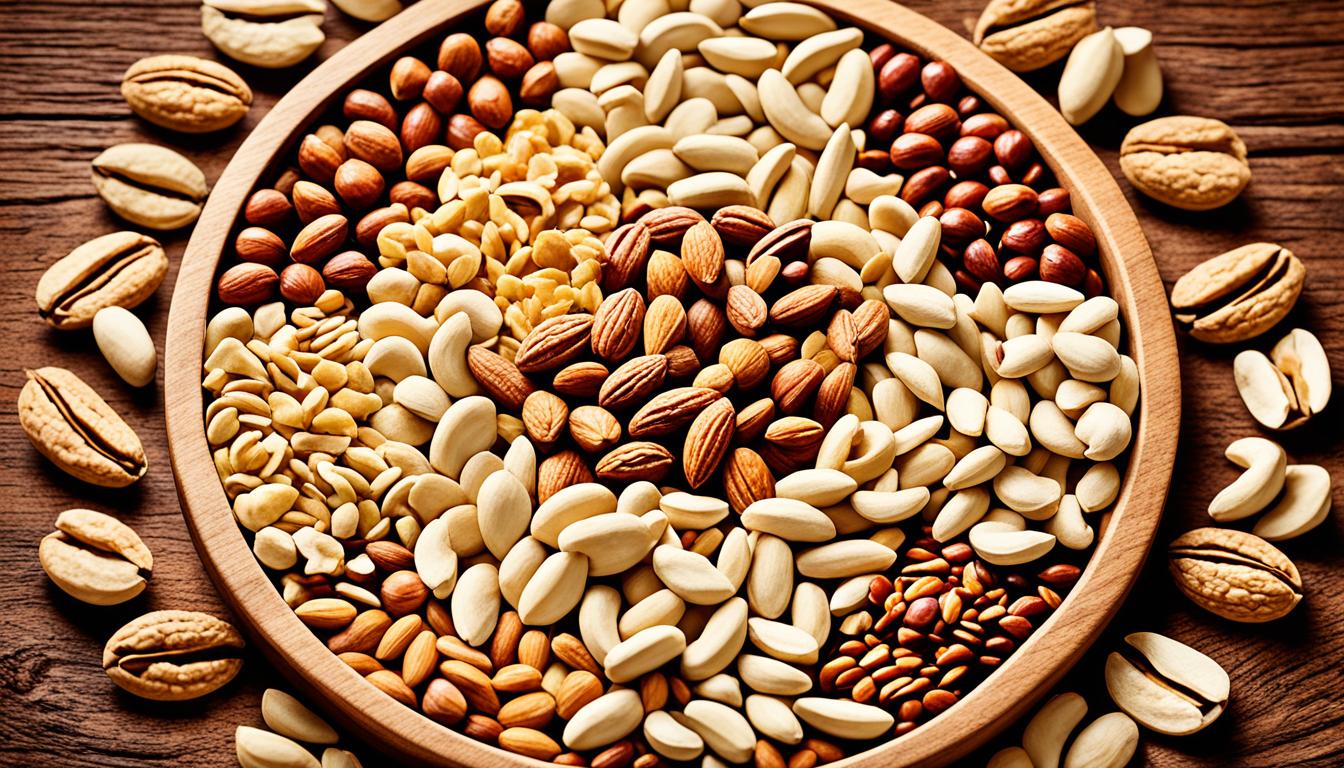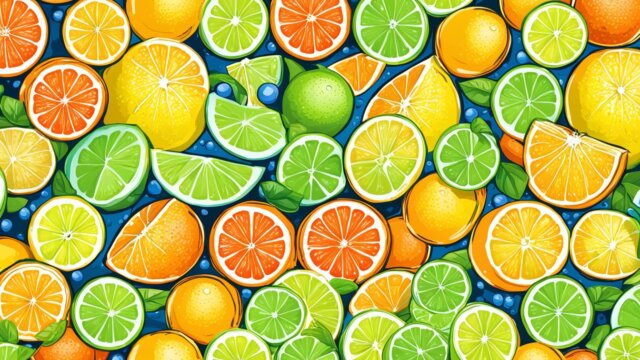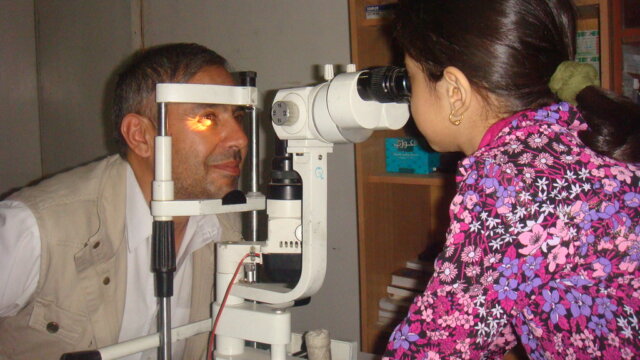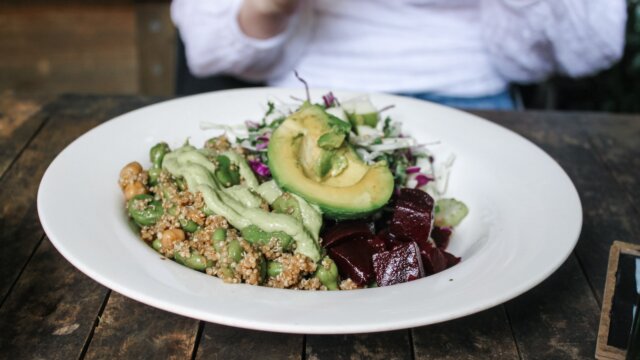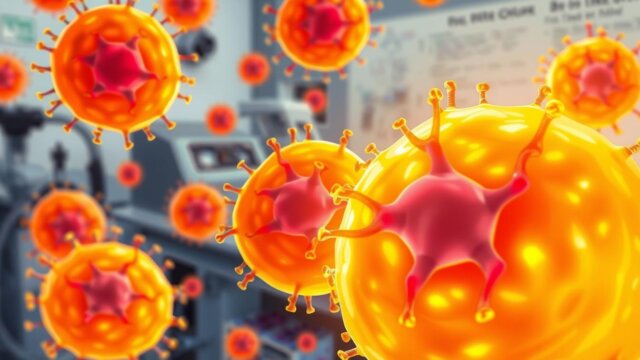FTC disclaimer: This post may contains affiliate links and we will be compensated if you click on a link and make a purchase.
Did you know a small handful of nuts or seeds is packed with nutrition? These tiny superfoods are full of vitamins, minerals, and compounds good for your health. They can help lower cholesterol, reduce heart disease risk, aid in weight control, and boost brain function.
Nuts and seeds with unsaturated fats like almonds, walnuts, and pistachios can lower bad cholesterol and heart disease risk. Omega-3 fatty acids in some nuts and seeds, like flaxseeds and chia seeds, are key for brain health. These natural powerhouses offer many more benefits.
Key Takeaways
- Nuts and seeds are full of healthy fats, protein, fiber, vitamins, and minerals.
- They can lower cholesterol, fight inflammation, and improve heart health.
- Nuts and seeds are a top source of omega-3 fatty acids, vital for brain function and growth.
- They help with weight management thanks to protein, fiber, and healthy fats.
- Nuts and seeds have a low glycemic index, helping to control blood sugar levels.
Nuts and Seeds: Tiny Yet Mighty
Nuts and seeds are small but packed with nutrients. They have healthy fats, protein, fiber, vitamins, minerals, and antioxidants. Eating different nuts and seeds helps your heart, brain, and can help you manage weight. They are great for a healthy diet.
Introducing Nature’s Little Nutritional Powerhouses
Nuts and seeds are nutritional superstars. Hemp seeds have 9 grams of protein in 3 tablespoons. Pumpkin seeds give you 8 grams of protein in 1 ounce. Peanuts and almonds each offer 7 grams of protein in 1 ounce. Sunflower seeds and pistachios have about 6 grams of protein per ounce. Cashews and flaxseeds give you 5 grams of protein per ounce. Hazelnuts and walnuts have around 4 grams of protein per ounce.
Nuts and seeds are also full of fiber. A ¼ cup of them gives you 2-3 grams of fiber. They help with weight control by making you feel full and slow down carb digestion. This is good for people with diabetes or high triglycerides.
They are also packed with vitamins, minerals, and phytonutrients. You’ll find vitamin E, selenium, magnesium, and more in them. Many diets, like the DASH and Mediterranean diets, suggest eating lots of nuts and seeds for their health benefits.
You can snack on nuts and seeds, add them to meals, or use them as toppings. These small foods can greatly improve your health. Try adding walnuts, almonds, sesame, or flaxseeds to your diet for more nutrients.
Heart-Healthy Superstars
Nuts and seeds are great for your heart. They are full of unsaturated fats. These fats can lower bad cholesterol and help prevent heart disease. Eating almonds, walnuts, or pistachios often can make your heart work better and lower heart disease risk.
These foods are also full of fiber, antioxidants, and plant sterols. Studies show that eating them can improve heart health. Foods like salmon, blueberries, citrus fruits, and legumes help keep your heart healthy.
Healthy fats in olive oil, avocados, and chia seeds are good for your heart too. Adding these foods to your daily meals is tasty and helps your heart stay healthy.
Food | Cardiovascular Benefits |
|---|---|
Fatty Fish (e.g., Salmon) | Rich in omega-3 fatty acids that can lower the risk of irregular heartbeat, plaque buildup, and decrease triglycerides |
Berries (e.g., Blueberries, Strawberries) | High in antioxidants and associated with a lower risk of heart attack in women |
Citrus Fruits | Contain flavonoids that may help with blood pressure, clotting, and inflammation, potentially reducing the risk of stroke and heart disease |
Legumes (e.g., Beans, Lentils, Peas) | Provide moderate evidence for benefits on coronary heart disease |
Olive Oil | Linked to mechanisms that prevent heart diseases and can help reduce cholesterol and blood sugar levels |
Green Tea | Consumption is associated with a 20% reduced risk of cardiovascular disease and stroke |
Coffee | Consumption linked to reductions in heart disease mortality |
Flax and Chia Seeds | High in plant-based omega-3 fatty acids, beneficial for heart health due to their fiber content |
Avocados | Rich in monounsaturated fat and antioxidants, contributing to lower heart disease risk factors |
Apples | Can reduce total cholesterol levels and are associated with protecting the heart due to their prebiotic content that supports beneficial gut bacteria linked to cardiovascular health |
Adding these foods to your diet can help keep your heart healthy and lower heart disease risk.
Brain Boosters for Cognitive Function
Some nuts and seeds are great for brain health and thinking skills. Flaxseeds and chia seeds are full of omega-3 fatty acids. These are key for keeping the brain working well and may help prevent brain problems as we get older.
Omega-3s in nuts and seeds help the brain stay healthy. A study in 2017 showed that eating foods with omega-3 made the brain work better.
Omega-3s and Brain Development
Nuts and seeds have more than just omega-3s. Avocados have vitamin E, which protects brain cells. Tomatoes have lycopene, an antioxidant that keeps brain cells healthy.
Quinoa is packed with nutrients that help the brain work right. Even red wine and dark chocolate have antioxidants that boost brain power.
Eating different nuts and seeds is an easy way to keep your brain healthy. They can make you think better and lower the risk of brain problems as you age. These foods are great for your brain.
“A 2014 study linked higher overall nut intake to better brain function in older age, emphasizing the positive impact of nuts and seeds on brain health.”
Weight Management Allies
Nuts and seeds can help with weight loss and weight management if eaten in small amounts. They have protein, fiber, and healthy fats. These nutrients make you feel full and less likely to eat too much. Eating these foods can also help you stop craving unhealthy snacks, which is good for keeping a healthy weight.
Almonds are great for feeling full and losing weight because they’re high in fiber and protein. Walnuts are full of omega-3 fatty acids, protein, and fiber. These help control hunger and support weight loss. Pistachios are low in calories and help you eat less by making you slow down. Cashew nuts have healthy fats, protein, and fiber. They help control cravings and keep you full between meals.
Nuts are full of fiber, which helps with digestion and staying full, which is key for weight loss. They also have important nutrients like iron, calcium, and vitamins. These support being active and healthy while managing your weight. Nuts also have anti-inflammatory properties that help with recovery after exercise and keep your heart healthy.
Nut | Benefits for Weight Management |
|---|---|
Almonds | High in protein, fiber, and healthy fats, helping reduce snacking and calorie intake. |
Walnuts | Rich in omega-3 fatty acids, support brain function, regulate appetite, and improve mood during weight loss. |
Pistachios | Lower calorie count per serving, making them a guilt-free option with a focus on mindful eating. |
Cashews | Combination of healthy fats and protein helps in feeling satisfied and curbing snack cravings. |
Brazil Nuts | High in selenium, benefiting metabolism and thyroid function, but should be consumed in moderation. |
For weight management, it’s important to control how much you eat. A small handful of nuts is a good amount because they have a lot of calories. Adding different kinds of nuts and seeds to your meals can help you stay at a healthy weight.
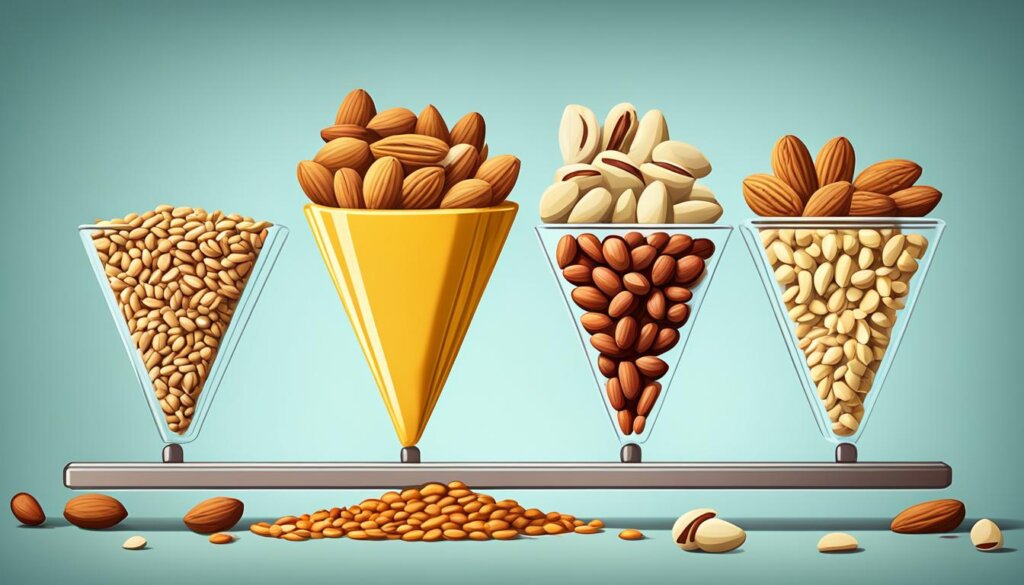
“Nuts have been shown to improve metabolic health and promote weight loss.”
Nuts and seeds are good for more than just weight management. They help your brain work better and keep your heart healthy. Adding these foods to your diet can help you stay healthy and reach your weight loss and weight management goals.
Nutrient Density Powerhouses
Nuts and seeds are full of vitamins, minerals, and antioxidants. They are true nutrient-rich powerhouses. These tiny foods have lots of health-boosting compounds. They can make you feel better overall.
Vitamins, Minerals, and Antioxidants Galore
Almonds are great for you because they have a lot of vitamin E. This antioxidant protects cells from harm. They also have 3.5 grams of fiber, which is 14% of what you need daily. Chia seeds give you 10 grams of fiber, which is 40% of your daily need.
Nuts and seeds are full of vitamins and minerals. Pistachios have over six grams of protein per ounce and about 49 nuts in a serving. Almonds, hazelnuts, sunflower seeds, and walnuts are also packed with antioxidants.
The fats in nuts and seeds are monounsaturated and polyunsaturated. These are the “healthy” fats that can lower cholesterol and reduce inflammation.
Adding these foods to your diet can help your heart, manage diabetes, and increase your life span.
“Nuts and seeds offer superior nutritional value compared to many modern diet staples, providing protein, fiber, healthy fats, and essential vitamins and minerals.”
You can eat them as snacks, add them to recipes, or use them in baking. Nuts and seeds are a tasty and healthy way to feed your body.
Blood Sugar Control Helpers
Eating nuts and seeds can help control blood sugar levels. These foods have a low glycemic index and are high in fiber. This can make your blood sugar more stable. Studies show that nuts like peanuts and almonds can lower blood sugar before and after meals. Fatty fish like salmon and sardines also have omega-3 fatty acids that help with blood sugar control.
Some plant-based foods are great for managing blood sugar too. Broccoli has sulforaphane, which lowers blood sugar. Pumpkin and its seeds can also lower blood sugar levels. Flaxseed is linked to better long-term blood sugar control. Beans, lentils, and fermented foods like kimchi and sauerkraut help with blood sugar and insulin sensitivity.
For people with diabetes or at risk, eating right is key. Choosing healthy foods and staying active and well-rested also helps with blood sugar control.
Food | Effect on Blood Sugar |
|---|---|
Broccoli | Reduces blood sugar levels |
Salmon and sardines | Improves blood sugar regulation |
Pumpkin and pumpkin seeds | Significantly decreases blood sugar levels |
Flaxseed | Reduces HbA1c, a marker of long-term blood sugar regulation |
Beans, lentils, and fermented foods | Improves blood sugar and insulin sensitivity |
Adding glycemic index-friendly foods like nuts, seeds, and plants to your diet can help manage blood sugar. This can lower your risk of diabetes and its complications.
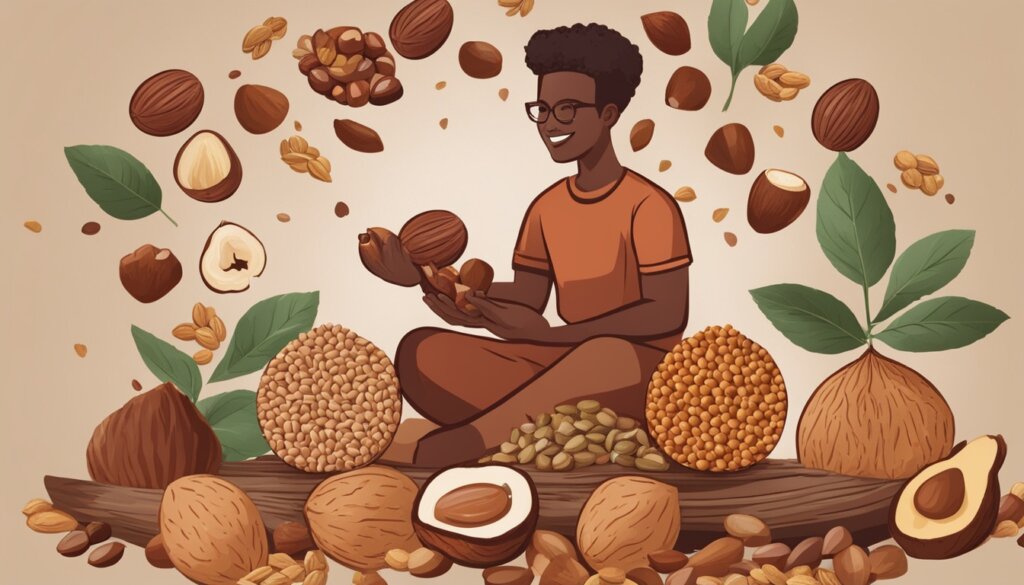
“Maintaining a balanced diet and incorporating these blood sugar-friendly foods can be crucial for individuals with diabetes or those at risk of developing the condition.”
Versatile Culinary Companions
From Snacks to Salads: Endless Possibilities
Nuts and seeds are great for cooking. They can be used in many ways, from snacks to recipes. You can add them to your yogurt, blend them into smoothies, or use them as a salad topping. The options are endless.
These ingredients can be added to many dishes. They make breads, pestos, soups, and stir-fries better. They add texture, taste, and nutrition.
For a quick snack, try roasted almonds or a mix of nuts and seeds. Add them to your oatmeal or yogurt for crunch. Or blend into a smoothie.
Nuts and seeds can be used in many meals. Add them to salads for crunch or as a topping for vegetables and grains. You can also blend them into pestos or use them as a coating for dishes.
Product | Price |
|---|---|
Almonds BBQ | $5.50 |
Blanched almond meal | $5.50 |
Almonds Sliced | $4.50 |
Brazil Nuts Dry Roasted | $7.00 |
Brown Flax Seeds Meal | $3.00 |
Brown Flax Seeds | $3.00 |
Brown Flax Seeds Meal | $5.99 |
Cashew Saffron | $5.99 |
Crystallized Sliced Ginger | $4.00 |
Date paste | $4.49 |
Dried Apricots | $6.50 |
Dried Cranberries | $4.00 |
Dried pink rose buds | $7.99 |
Dry Roasted Hulled Sesame Seeds | $4.00 |
Dry Roasted Unsalted Pistachio Kernel | $9.00 |
Golden Raisins | $3.99 |
Green Cardamom | $9.99 |
Roasting nuts and seeds makes them tastier. It uses less fat than frying, making it healthier. Roasting also keeps more nutrients, unlike cooking in water which can lose vitamins.
Adding nuts and seeds to your meals makes cooking fun and adds crunch. Try new recipes and see how these ingredients can improve your dishes.
Nuts and Seeds: A Global Culinary Delight
Let’s dive into the world of global foods, where nuts and seeds play a big role. They add flavor and nutrition to dishes from all over. In Latin American cooking, you’ll find Brazil nuts, cashews, and pecans adding savory tastes. In Africa, pumpkin and sunflower seeds bring earthy flavors to meals.
Learn how different cultures use nuts and seeds in their cooking. This opens up new ways to enjoy these tasty and healthy foods. The hard work to grow macadamia trees and the process of making cashews shows their global popularity.
Chia seeds are a big deal for vegetarians and vegans because they’re full of nutrients. Peanuts love the warm weather and have a special way of growing, making them a staple in many cuisines.
As more people learn about the health benefits of activated nuts and seeds, their popularity grows. Discover how different cultures use these ingredients in their cooking. From crunchy pumpkin seeds to complex sesame seeds, each culture has its own way of enjoying them.
Nut/Seed | Nutritional Profile |
|---|---|
Brazil Nuts | 4 grams of protein, 18.8 grams of fat, 2.1 grams of dietary fiber, 185 calories, 3.5 grams of carbs, 542 micrograms of selenium |
Cashews | 0.9 grams of dietary fiber, 5.1 grams of protein, 81.8 milligrams of magnesium, 166 milligrams of phosphorus, 155 calories, 9.2 grams of carbohydrates |
Almonds | 5.9 grams of protein, 3.4 grams of dietary fiber, 14 grams of fat, 161 calories, 6.1 grams of carbohydrates, 5.7 milligrams of magnesium |
Hazelnuts | 4.2 grams of protein, 2.7 grams of dietary fiber, 176 calories, 17 grams of fat, 4.7 grams of carbs, 0.2 milligrams of thiamine |
Walnuts | High in omega-3 fats, antioxidants, and phytosterols, powerhouses for the heart and brain, aiding in reducing depression and Alzheimer’s risk |
Macadamia Nuts | 4 grams of protein, 1.2 milligrams of manganese, 203 calories, 21.4 grams of fat, 2.2 grams of carbs, 0.2 milligrams of copper |
Peanuts | Offer the highest amount of folates compared to other nuts, essential for brain development and high in Vitamin E |
Specialty shops like the NY Spice Shop offer a wide range of nuts and seeds. They also have herbal teas, coffee, spices, herbs, and dried fruits. This lets you start a global culinary adventure from your kitchen.
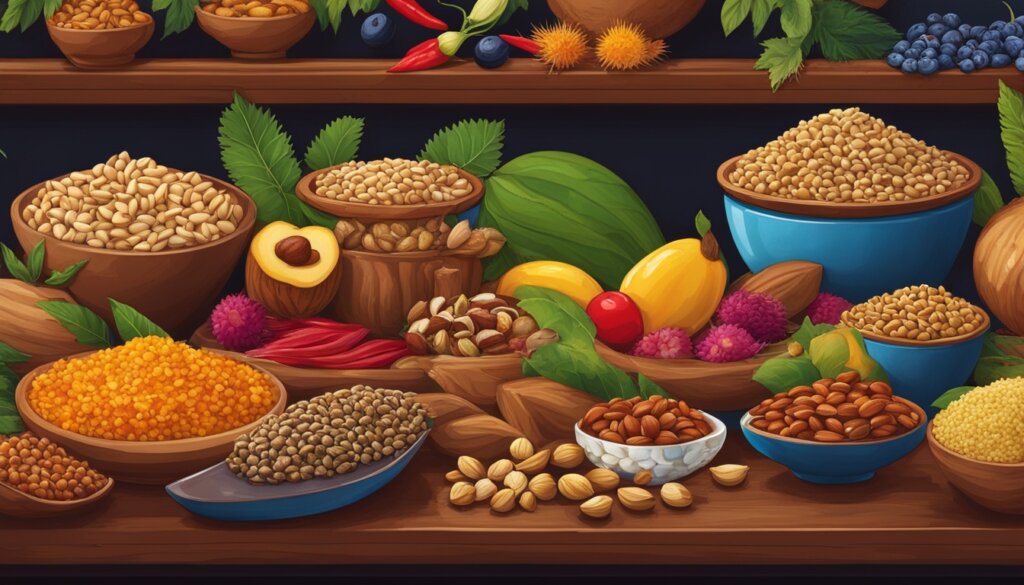
Embrace the rich world of global foods and let nuts and seeds inspire your cooking. They open up a world of new tastes and experiences.
Antioxidants and Anti-Inflammatory Properties
Nuts and seeds are full of nutrients and have many good compounds called phytonutrients. These include phenolic acids, carotenoids, flavonoids, and proanthocyanidins. They help fight off harmful free radicals and reduce inflammation. This can make you healthier and happier.
Exploring the Phytonutrient Power
Nuts and seeds have a lot of phytonutrients. Studies show that eating nuts can lower the risk of heart disease, cancer, and other health problems. Eating plants, which often have nuts and seeds, can also lower the chance of getting type 2 diabetes.
Nuts and seeds are great for fighting off free radicals and reducing inflammation. Eating walnuts can make your blood fats better and lower heart disease risk. Nuts can also help people with diabetes stay away from heart disease. In a Mediterranean study, nuts were linked to less cancer and death.
Eating nuts can lower inflammation and increase a protein that fights inflammation. Walnuts are full of omega-3 fats, which can lower inflammation and heart disease risk.
Other nuts and seeds like peanuts, almonds, pistachios, flaxseed, and chia seeds are also good for you. Peanuts give you a lot of magnesium and help control blood sugar. Almonds are high in fiber, which helps with weight control and lowers inflammation. Pistachios can help you lose weight and lower bad cholesterol. Flaxseed is a great source of ALA and can lower your cholesterol. Chia seeds are very high in fiber, which helps you feel full and manage your weight.
Adding nuts and seeds to your meals can help you get the benefits of phytonutrients. These can reduce inflammation and support your overall health and well-being.
Fiber for Digestive Health
Nuts and seeds are great for fiber. They have both soluble and insoluble fiber. This is key for a healthy gut. Fiber helps make the intestines move better and stronger. Soluble fiber is good for your heart by lowering blood pressure and cholesterol.
Eating more fiber can make your gut healthier. It helps good microbes grow in your gut. Women need 25 grams of fiber a day, and men need 38 grams. But most people only get about 15 grams.
To get more fiber, try nuts and seeds. Black beans have 5.4 grams of soluble fiber. Lima beans have 5.3 grams, and kidney beans have 3 grams. You can also eat Brussels sprouts, sweet potatoes, broccoli, pears, figs, and guavas for fiber.
Adding fiber-rich nuts and seeds to your diet helps your gut and overall health. Make these foods a big part of your meals and snacks.
“Fiber works best when it absorbs water, making stool soft and bulky.” –
Dietary Patterns and Nuts and Seeds
The DASH and Mediterranean Diets are great for health. They suggest eating lots of plant-based foods, like nuts and seeds. These foods are key in these diets. They focus on fruits, veggies, whole grains, and plant proteins. Adding nuts and seeds to a plant-based diet helps with health and happiness.
Embracing Plant-Based Eating
Studies show nuts and seeds are good for us. They are full of phytochemicals, antioxidants, and other good stuff. Eating walnuts can make us healthier because of their nutrients. Pistachios also have health perks.
The Mediterranean nuts have a long history of health benefits. A big review found eating nuts lowers the risk of heart disease, cancer, and death.
Nut or Seed | Potential Health Benefits |
|---|---|
Almonds | Rich in phytochemicals, antioxidants, and bioactive compounds |
Walnuts | Micronutrient-rich, associated with improved health outcomes |
Pistachios | Specific health benefits associated with their consumption |
Mediterranean Nuts | Ancient medicinal benefits and symbolic significance in public health nutrition |
Choosing a plant-based diet with nuts and seeds is smart. It gives you lots of nutrients and health perks. These foods help with heart health, lower cancer risk, and make you live longer.
Incorporating Nuts and Seeds into Your Diet
Adding nuts and seeds to your daily meals is easy and tasty. They are full of protein, healthy fats, fiber, vitamins, and minerals. This makes them great for any meal or snack.
Nuts and seeds don’t spoil easily, so they’re perfect for snacking on the go. Keep them in your gym bag, backpack, or at work. This way, you always have a quick, healthy snack.
You can add nuts and seeds to many dishes. Sprinkle them on salads, cereals, or yogurt for extra crunch and taste. Use them in baked goods, like muffins or granola bars, or add them to soups and stir-fries.
Getting creative with nuts and seeds in your meals and snacks is a great idea. They help keep your heart healthy and support your brain function. Adding them to your diet is a smart move for a balanced, healthy life.
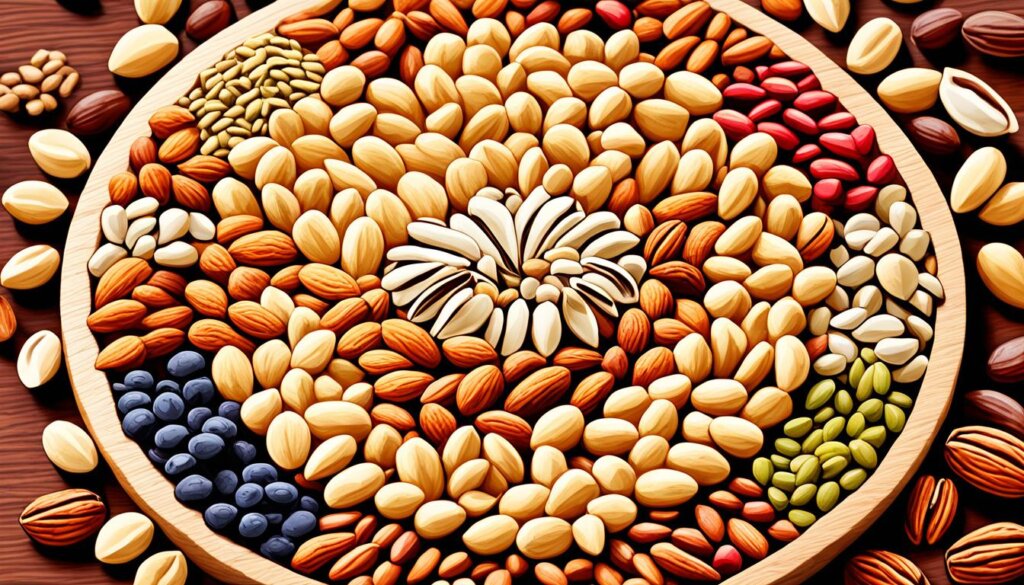
“Nuts and seeds are a nutritious and convenient way to add more plant-based protein, healthy fats, and essential vitamins and minerals to your diet.”
If you’re always on the move, love fitness, or want to make healthy snacking easier for your family, nuts and seeds are a great choice. They’re easy to add to your diet and support your health and well-being.
Conclusion
Nuts and seeds are great for your health. They can help lower heart disease risk by 30% to 50%. They also help with weight and blood sugar control. Plus, eating more nuts can lower the risk of many diseases.
These foods are full of vitamins, minerals, fiber, and healthy fats. They also have antioxidants and anti-inflammatory compounds. Adding them to your diet can make you healthier. For example, eating 2 to 3 grams of omega-3 fatty acid daily can lower heart disease risk. Hazelnuts are also good because of their special nutrients.
Using nuts and seeds in your cooking and snacks can boost your health. It’s a simple way to eat better and support a plant-based diet. Enjoying nuts and seeds can bring many health benefits.
FAQ
What are the health benefits of nuts and seeds?
Nuts and seeds are full of important nutrients. They have healthy fats, protein, fiber, vitamins, minerals, and antioxidants. These can help your heart, brain, weight, and blood sugar levels.
How do the healthy fats in nuts and seeds contribute to cardiovascular health?
Nuts like almonds, walnuts, and pistachios have unsaturated fats. These fats help lower bad cholesterol and reduce heart disease risk. They also have fiber, antioxidants, and plant sterols for heart health.
What is the role of omega-3 fatty acids from nuts and seeds in brain function?
Flaxseeds and chia seeds are great for omega-3 fatty acids. These fats are key for brain health and development. They help keep your brain working well and may lower the risk of brain problems as you age.
How can nuts and seeds aid in weight management?
Even though nuts and seeds have a lot of calories, they can help with weight control. They have protein, fiber, and healthy fats. These make you feel full and less likely to eat too much.
What are the key nutrients and antioxidants found in nuts and seeds?
Nuts and seeds are full of vitamins, minerals, and antioxidants. Pumpkin seeds have a lot of magnesium. Almonds are high in vitamin E, a strong antioxidant. They also have many plant compounds that are good for health.
How can nuts and seeds help manage blood sugar levels?
Adding nuts and seeds to your diet can help control blood sugar. They are good for people with diabetes or at risk of it. Their low glycemic index and high fiber help keep blood sugar stable.
In what ways can nuts and seeds be incorporated into a healthy diet?
Nuts and seeds are versatile. Enjoy them as a snack, on salads, in smoothies, or as a topping for oatmeal. They can also be added to many dishes, like bread, pesto, soups, and stir-fries.
How are nuts and seeds used in various cultural cuisines around the world?
Nuts and seeds are popular worldwide and are used in many cuisines. In Latin America, they use Brazil nuts, cashews, and pecans. In Africa, pumpkin and sunflower seeds are common in cooking.
What are the benefits of the fiber and gut-healthy compounds found in nuts and seeds?
Nuts and seeds are full of fiber, which is good for your digestive system. Fiber helps with bowel regularity. Soluble fiber is good for your heart and blood pressure. Eating more fiber also helps your gut health and immune system.
How do nuts and seeds fit into healthy dietary patterns?
Healthy diets like the DASH and Mediterranean diets recommend eating lots of plant-based foods. Nuts and seeds are key in these diets. They focus on fruits, vegetables, whole grains, and plant-based proteins.
